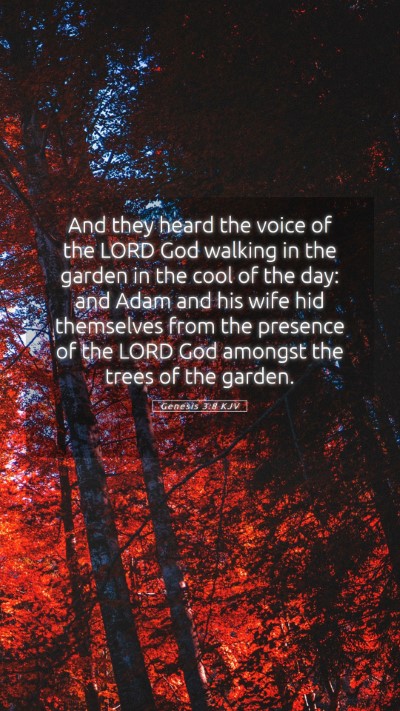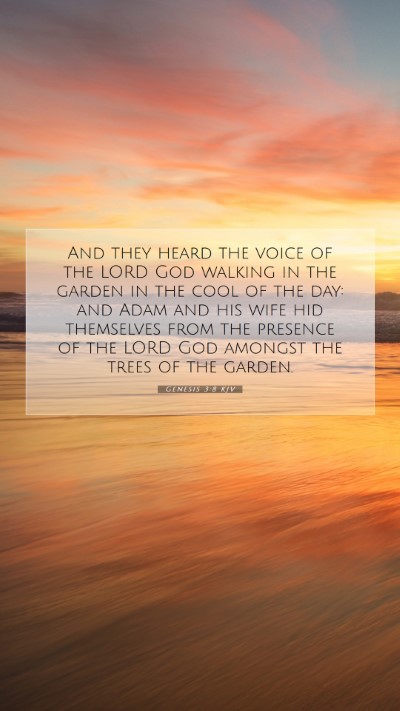Understanding Genesis 3:8
The verse Genesis 3:8 reads: "And they heard the voice of the LORD God walking in the garden in the cool of the day: and Adam and his wife hid themselves from the presence of the LORD God amongst the trees of the garden." This verse captures a poignant moment in biblical history, illustrating both the intimacy and the alienation that sin can cause in our relationship with God.
Bible Verse Commentary
1. Context of the Verse
This situation occurs after Adam and Eve have eaten from the forbidden tree, thus introducing the knowledge of good and evil, which fundamentally changes their experience with God and each other. The presence of God, once a source of joy, becomes an occasion for fear and shame.
2. Insights from Matthew Henry
Matthew Henry emphasizes that the “voice of the Lord” signifies God’s communication with humankind. The act of God walking in the garden showcases His desire for fellowship with Adam and Eve. However, their disobedience leads them to hide, illustrating the immediate consequences of sin—alienation from God and an urgent need for reconciliation.
3. Insights from Albert Barnes
Albert Barnes elaborates on the phrase “walked in the garden.” This indicates a personal and relational God, who seeks intimacy with His creation. The “cool of the day” often symbolizes a time of peace and reflection. Barnes suggests God’s desire to have personal communion with man and the tragedy of man’s choice to hide from Him, resulting in spiritual separation.
4. Insights from Adam Clarke
Adam Clarke points out the significance of this moment as a turning point in humanity's relationship with God. The hiding signifies shame and fear that emerge post-sin. Clarke highlights that the “trees of the garden” serve as a metaphor for the false security that people often seek in sin, which ultimately leads to deeper separation from God.
Key Themes and Applications
- Intimacy vs. Alienation: Genesis 3:8 highlights how sin disrupts the innate relationship between God and humanity. Before their disobedience, Adam and Eve walked freely with God, but sin created a barrier that caused them to hide.
- The Consequences of Sin: The act of hiding demonstrates the immediate psychological effects of sin—fear, shame, and separation from one’s Creator. This verse serves as a reminder of the spiritual ramifications that accompany disobedience.
- The Nature of God: Despite the fall, God's desire for relationship remains evident as He seeks out Adam and Eve. This reflects the biblical notion that God actively pursues humanity, even after sin has entered the world.
- The Voice of God: Listening to God's voice is crucial. As He calls out to Adam and Eve, it serves to remind believers that God seeks communication, and His voice offers guidance, comfort, and correction.
Cross References
- Genesis 1:26-27: The creation of humanity in God’s image sets the stage for the intimate relationship that is broken by sin.
- Genesis 2:16-17: God’s command regarding the forbidden tree emphasizes the importance of obedience to his Word.
- Isaiah 59:2: This verse articulates how sin creates a separation between God and humanity, paralleling the hiding in Genesis 3:8.
- Romans 3:23: "For all have sinned and come short of the glory of God"—illustrating the universal nature of sin and its consequences.
- Psalm 139:7-12: This passage speaks to the omnipresence of God and how there is no escaping His presence, unlike Adam and Eve's attempt to hide.
Conclusion
Genesis 3:8 serves as a foundational verse that underscores the significance of human choice, the reality of sin, and God’s continued desire for relationship. The themes derived from this passage remind believers of the importance of understanding Scripture and the ongoing need for reconciliation with God through Christ.


